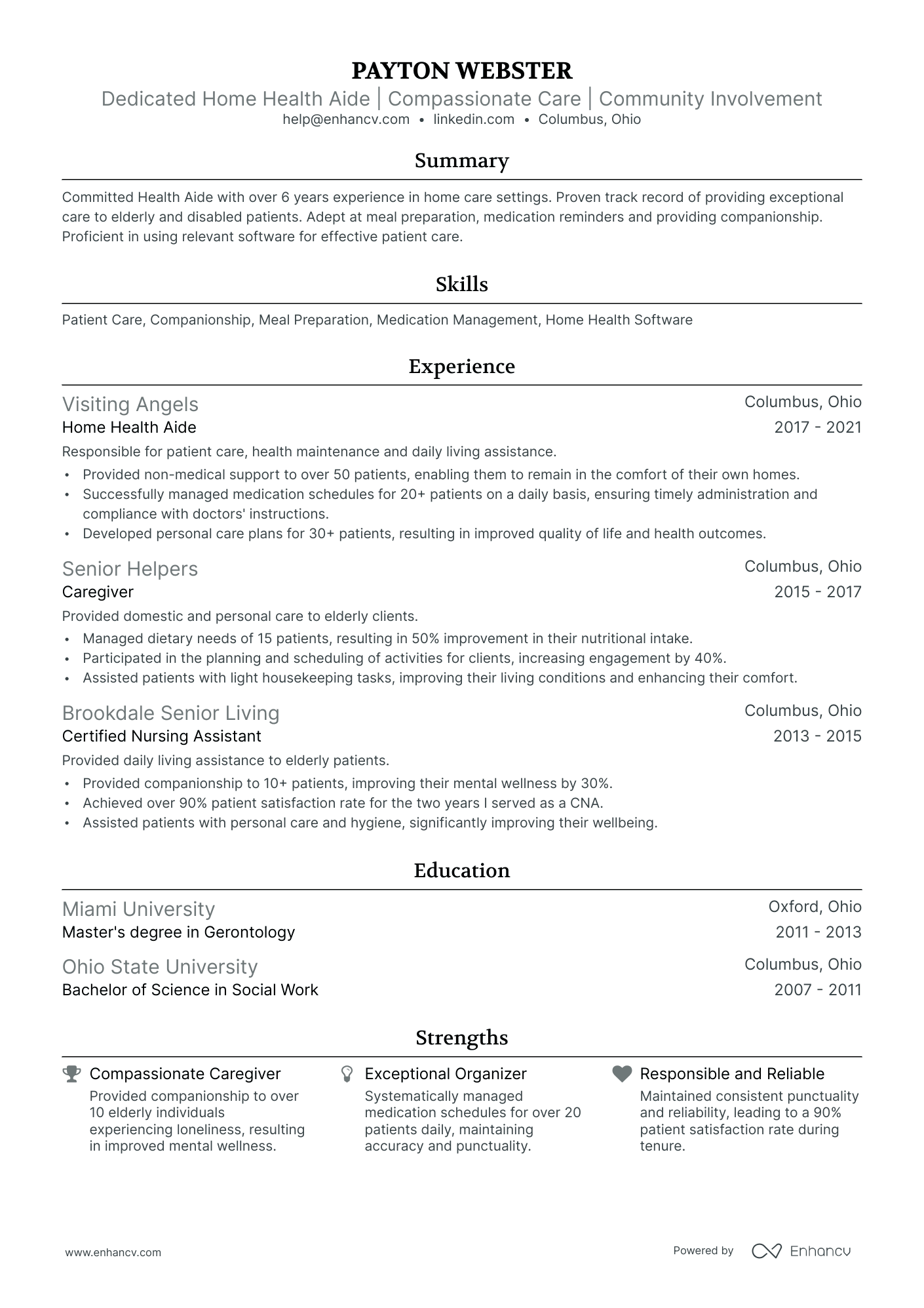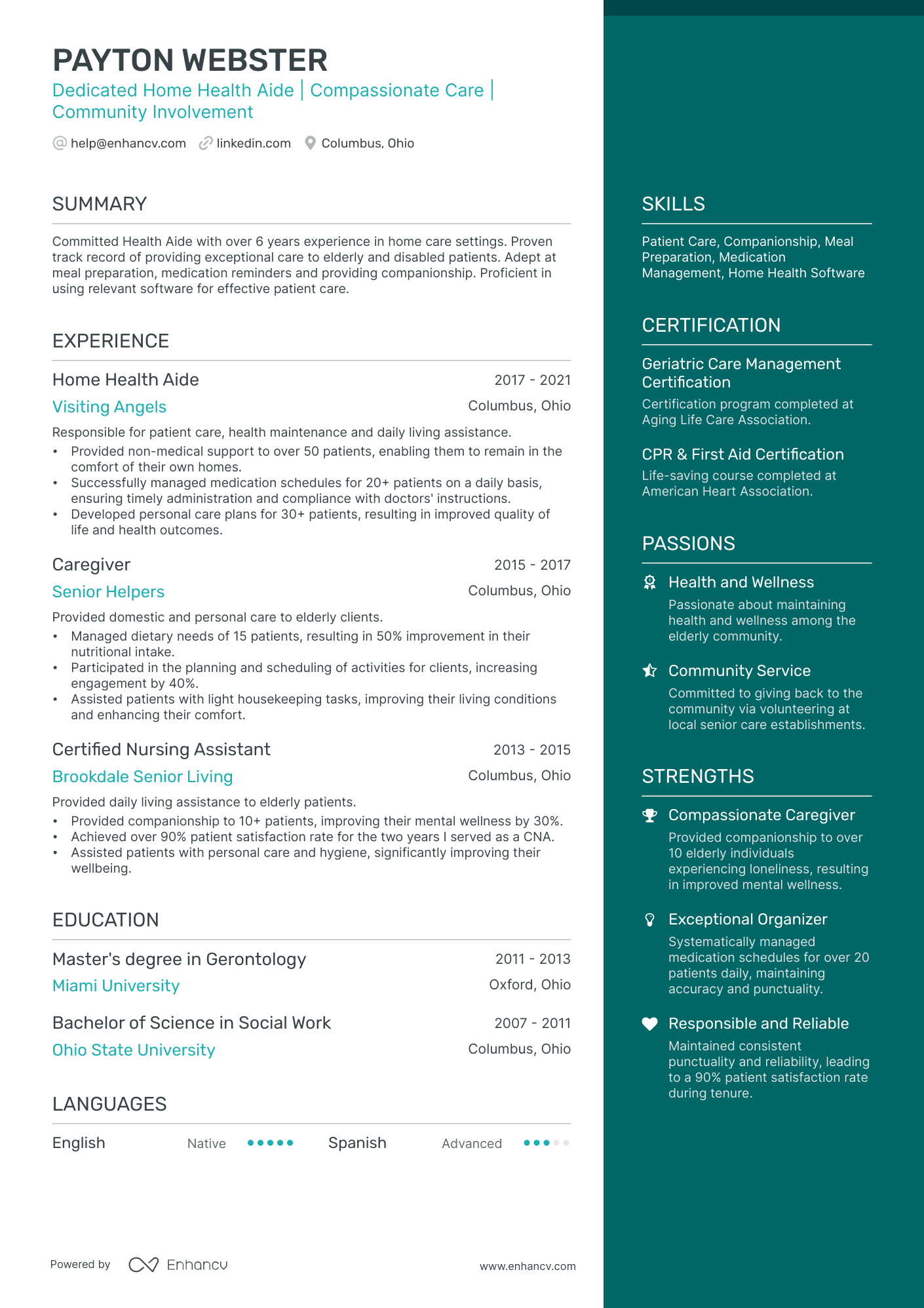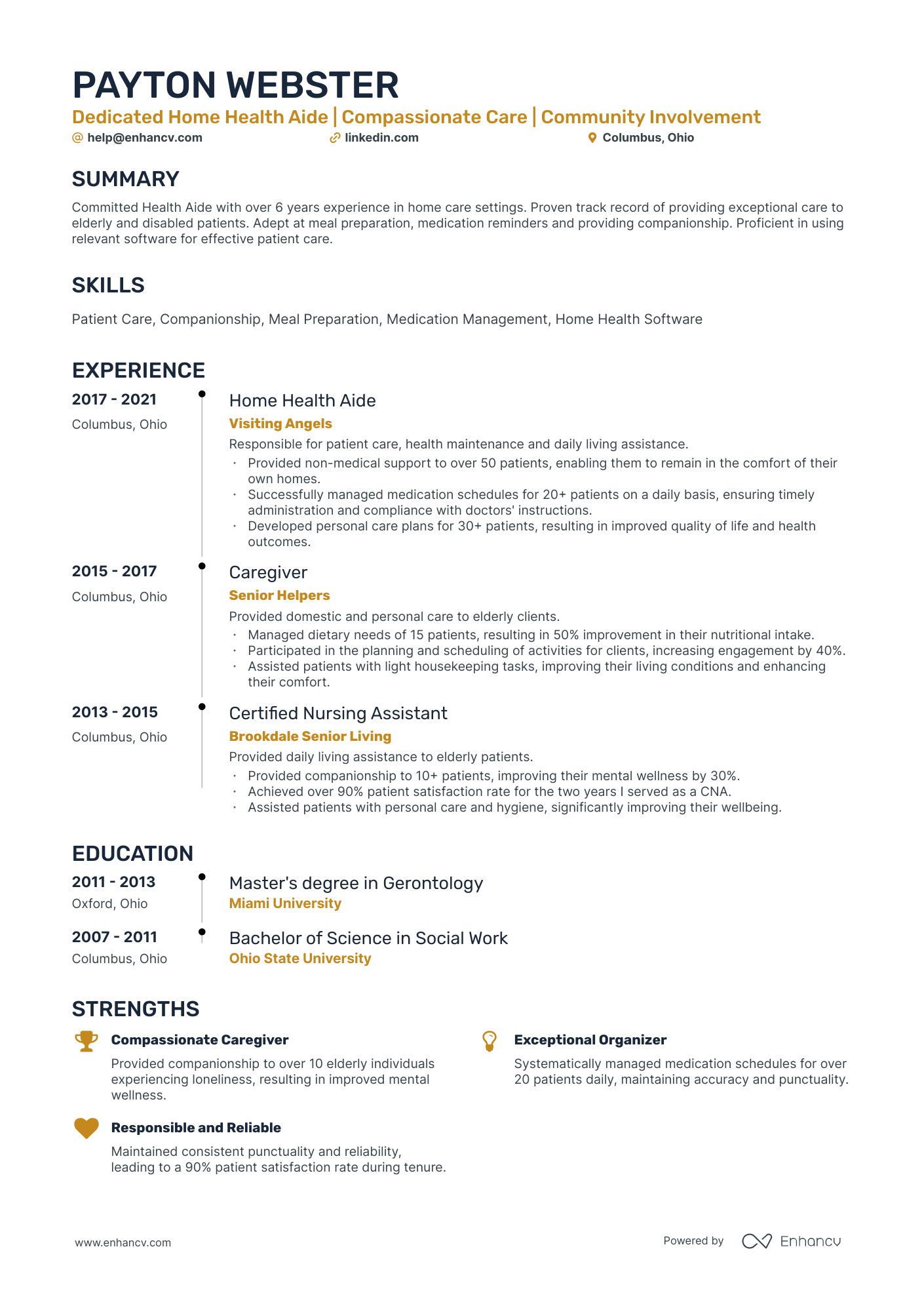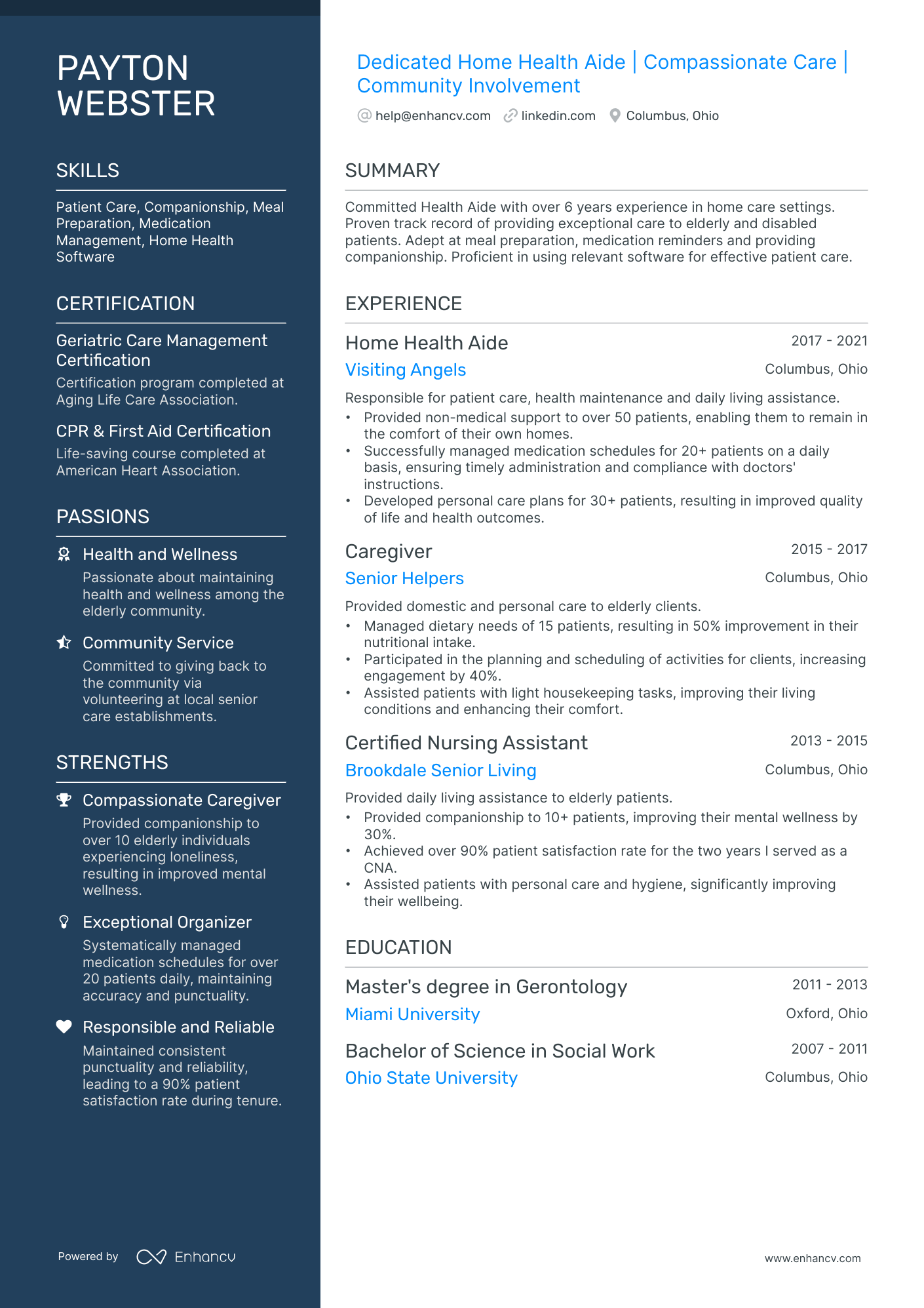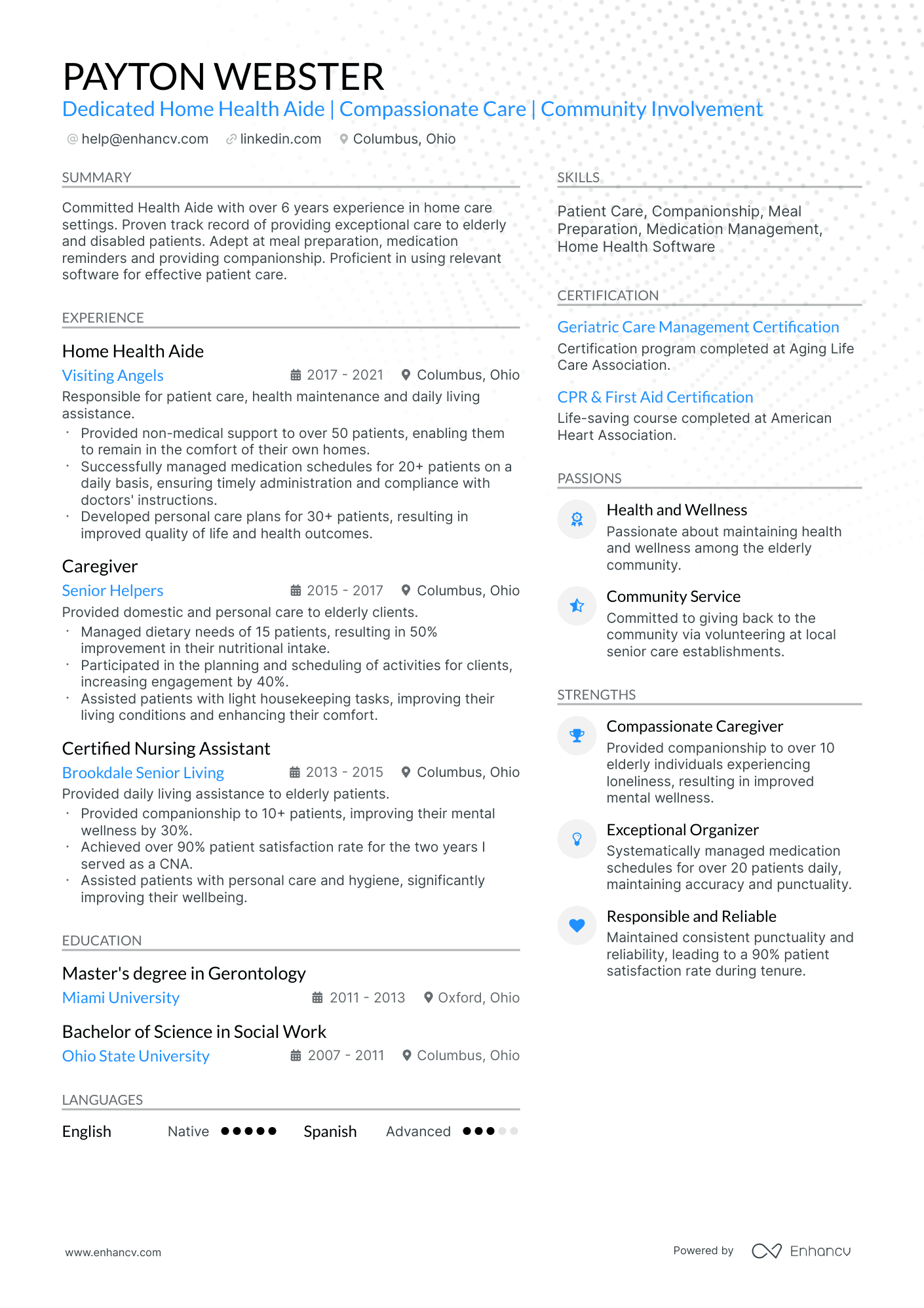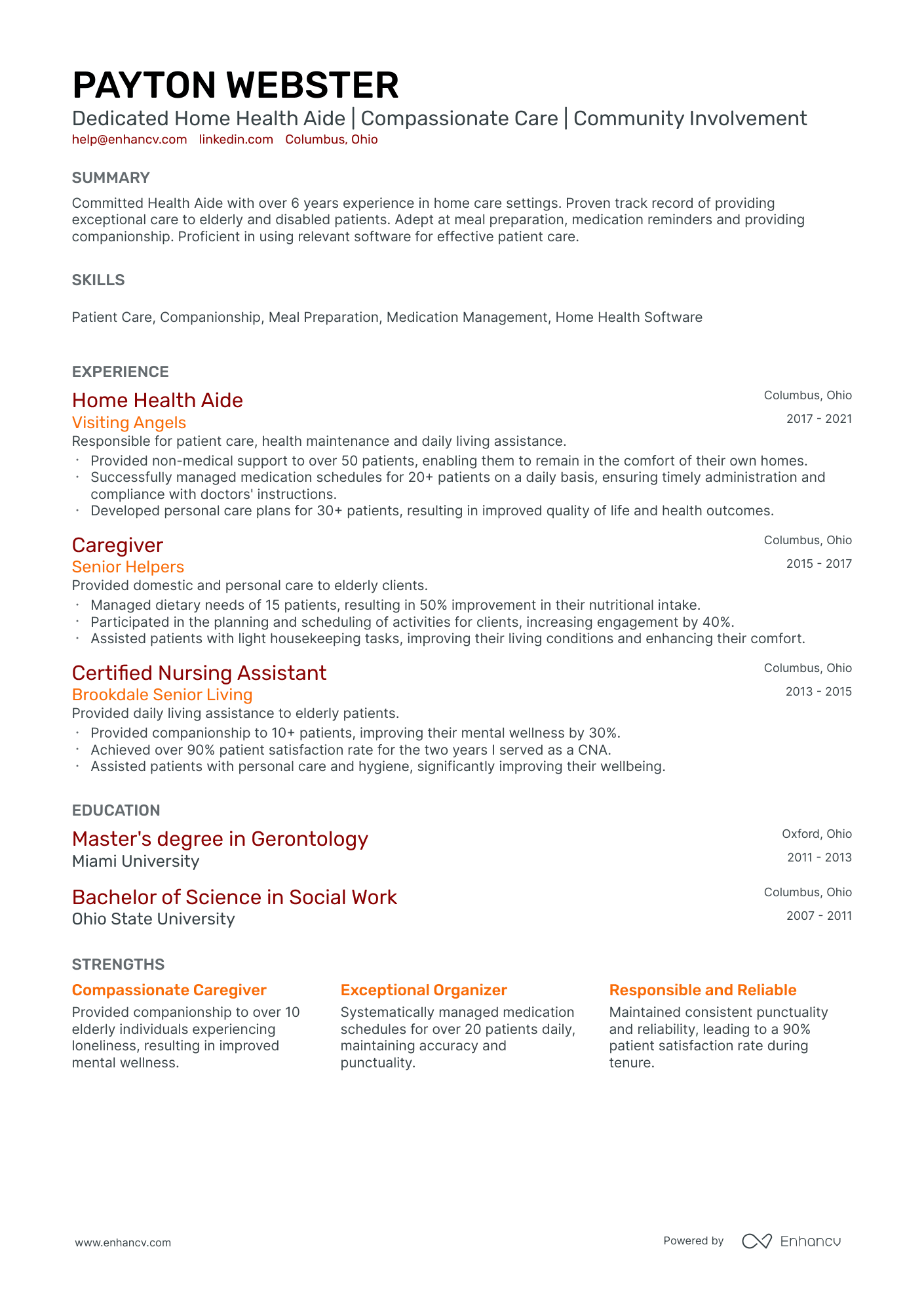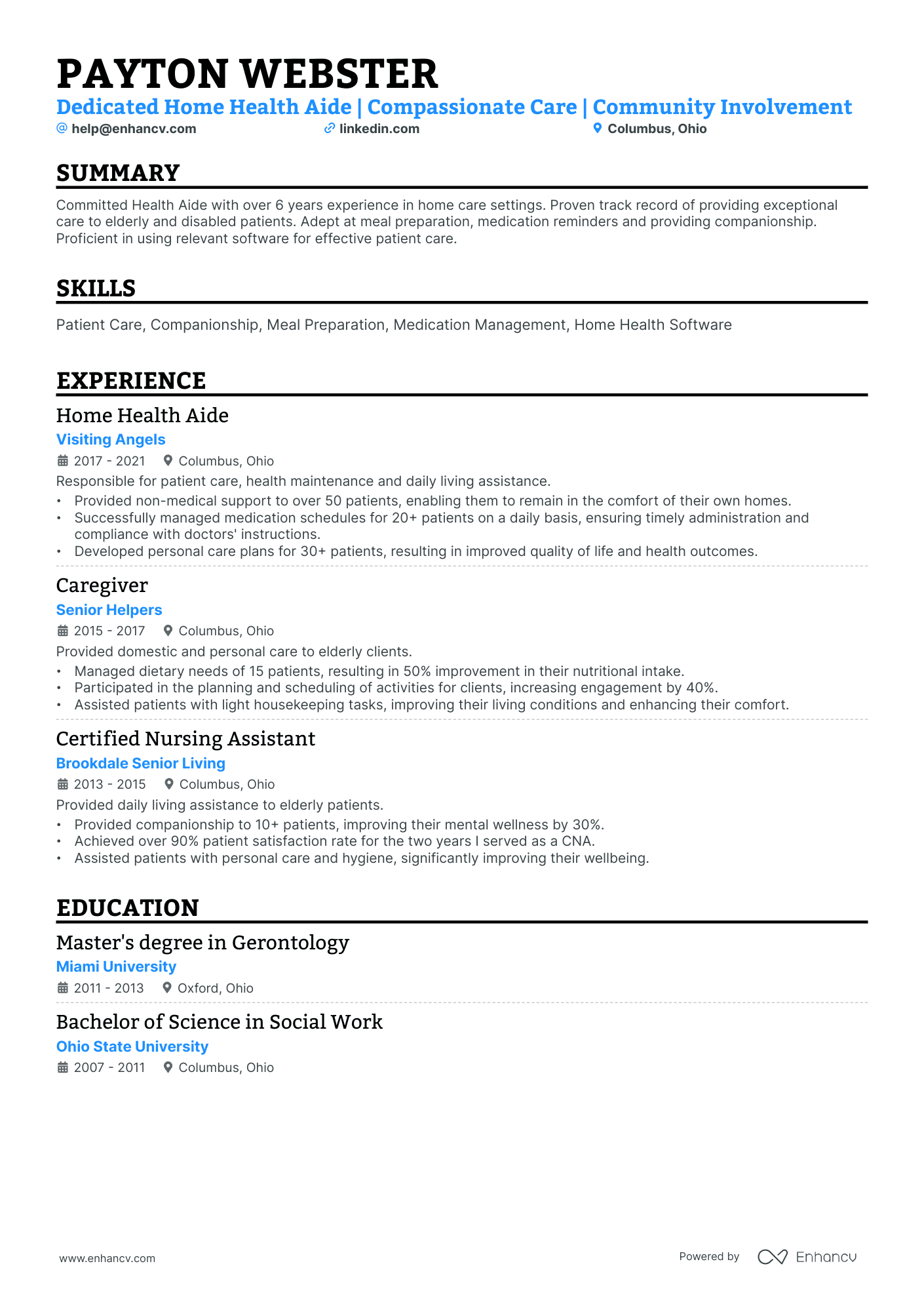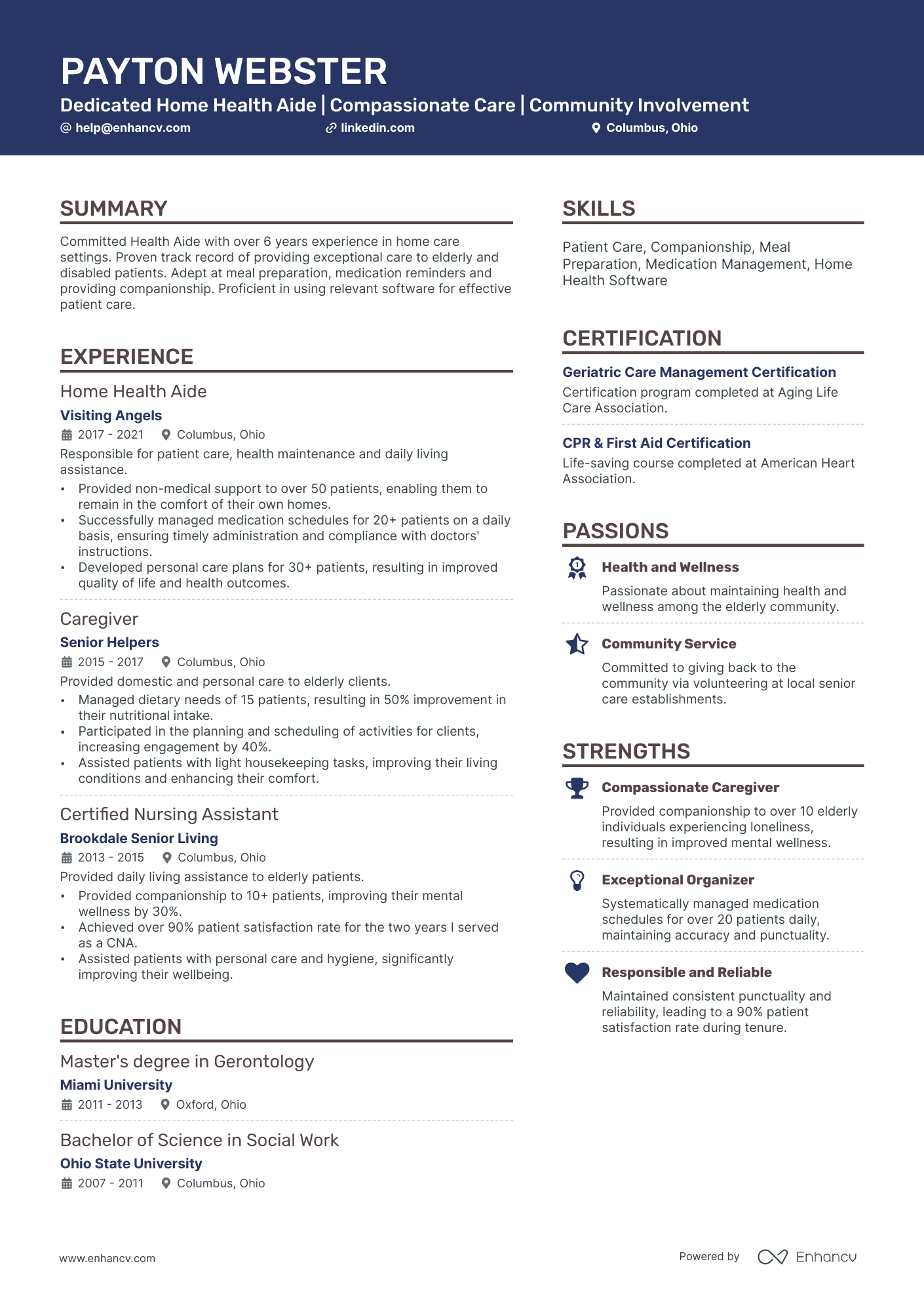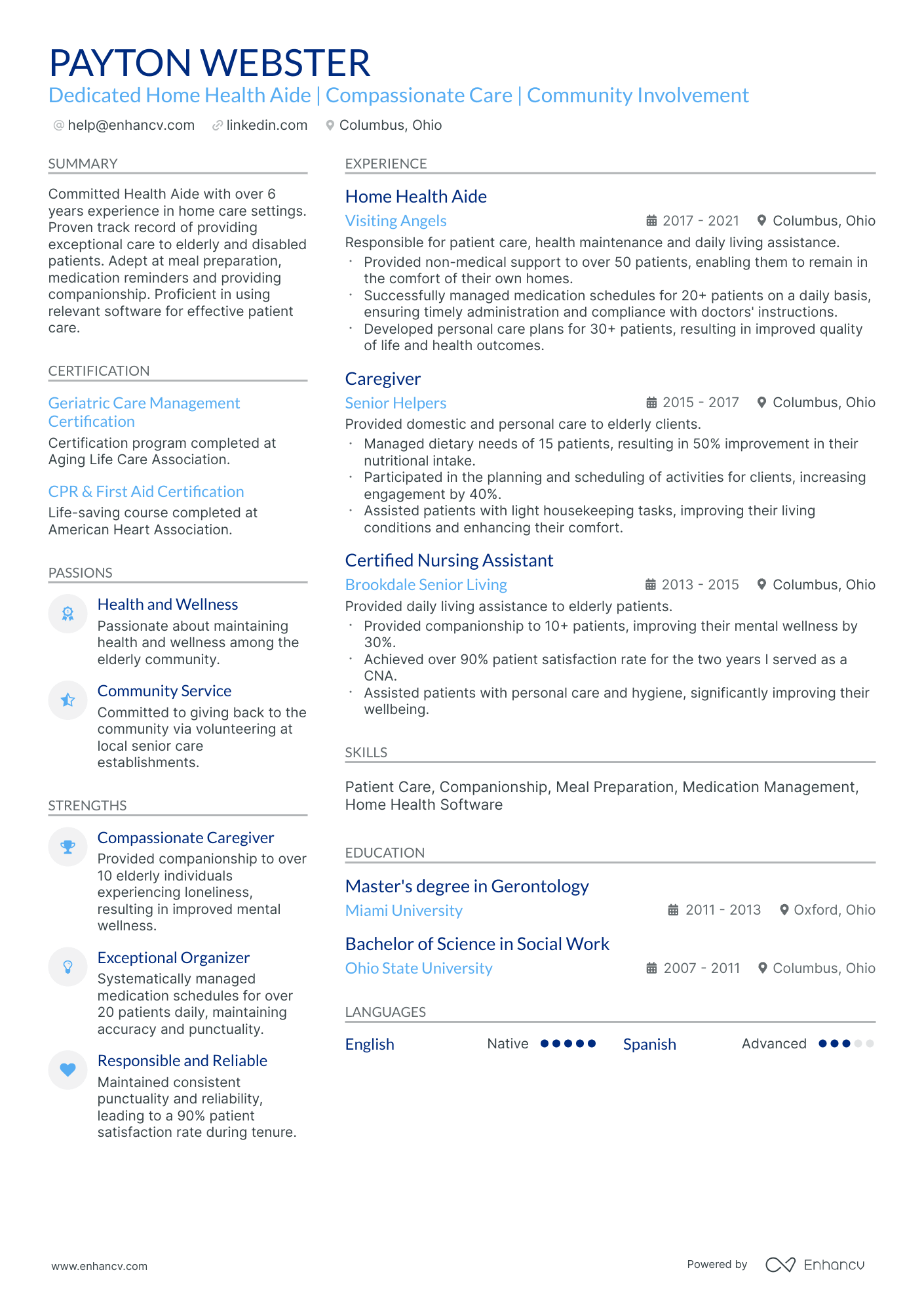Private caregivers often struggle to quantify and clearly express the emotional intelligence and soft skills necessary for their roles on a resume. Our guide can help by providing practical advice and specific examples on how to translate these essential caregiving abilities into measurable achievements and compelling resume content.
Dive into this guide to discover how to craft a compelling private caregiver resume:
- Explore top-tier private caregiver resume samples, spotlighting industry-leading skills and experiences.
- Uncover over ten tailored strategies to make your private caregiver resume resonate with the job description.
- Illuminate your unique value as a private caregiver candidate, using your professional achievements as a guide.
- Debunk the myth that education doesn't matter, and learn how to leverage your academic and certification credentials effectively.
Recommended reads:
Tips for refining your private caregiver resume format
The resume format sets the stage for your professional narrative. Ensure it:
- Adopts the reverse-chronological format, placing your most recent experiences at the forefront. This format is ideal for those with relevant and up-to-date experience.
- Features a clear headline, making it straightforward for recruiters to access your contact details, portfolio, or current role.
- Stays concise, ideally spanning no more than two pages, focusing on relevant experiences and skills.
- Maintains its layout by being saved as a PDF, ensuring compatibility with Applicant Tracking Systems (ATS).
Consider the local standards – Canadian resumes, for example, may have a different format.
Upload your resume
Drop your resume here or choose a file. PDF & DOCX only. Max 2MB file size.
Pro tip
While color can enhance your private caregiver resume by emphasizing key details like headlines, job titles, and degrees, moderation is key. Stick to a primary and a secondary color to maintain professionalism and avoid a cluttered appearance.
Key sections to include in your freight broker resume are:
- The header - with your contact details (like email and phone number), a link to your portfolio, and a headline.
- The summary (or objective) - highlighting the high points of your career so far.
- The experience section - limit yourself to six bullets per role to focus on specific results.
- The skills list - offering a balanced mix of your personal and professional talents.
- Education and certification - displaying your most relevant degrees and certificates for the freight broker role.
What recruiters want to see on your resume:
- Experience with Patient Care: Demonstrating a solid background in personal care, including tasks like bathing, dressing, and feeding patients.
- Certifications: Relevant qualifications such as CPR/First Aid training, Certified Nursing Assistant (CNA) certification, or other healthcare-related certificates.
- Skills in Specialized Care: Experience in dealing with specific conditions, like Alzheimer's, dementia, physical disabilities, etc., is highly valued.
- Communication Skills: Strong interpersonal and communication skills, both for interacting with patients and for communicating their status to family members or medical professionals.
- Reliability and Compassion: Evidence of being trustworthy, dependable, and empathetic, as caregivers often need to provide emotional support to patients.
Recommended reads:
Decoding the private caregiver resume experience section
Once you've settled on your resume's format, the next step is detailing your professional journey.
Many private caregiver professionals grapple with this section, especially when balancing between extensive or limited experience. Here's a roadmap to navigate this:
- Limit bullet points under each job role to six, focusing on high-impact contributions.
- Highlight achievements that resonate with the job's requirements, rather than just listing duties.
- Detail any on-the-job certifications or skills acquired and their relevance to your growth.
- Choose impactful verbs for each bullet, avoiding overused terms like "managed".
- Infuse relevant keywords from the job posting, especially in the context of accomplishments.
For more insights, explore these curated examples from seasoned private caregiver professionals:
- Provided personalized care and assistance to elderly clients, ensuring their safety, comfort, and well-being.
- Assisted with daily activities, including bathing, dressing, medication management, and meal preparation.
- Implemented specialized exercise programs resulting in improved mobility and overall physical health of clients.
- Monitored vitals and reported any changes or concerns to healthcare professionals.
- Managed household tasks such as light housekeeping, laundry, and grocery shopping for clients.
- Collaborated with medical team to develop customized care plans for patients with chronic illnesses.
- Administered medications accurately and assisted with medical procedures under the supervision of healthcare professionals.
- Provided emotional support and companionship to individuals, improving their mental well-being.
- Assisted in rehabilitative exercises resulting in increased strength and range of motion for patients.
- Documented patient progress, maintaining accurate records for healthcare providers.
- Ensured a safe and comfortable environment for clients with disabilities, adapting care techniques to meet individual needs.
- Assisted with personal grooming, feeding, and mobility, promoting independence and self-care skills.
- Collaborated with therapists to implement therapeutic activities, enhancing clients' physical and cognitive abilities.
- Managed challenging behaviors with patience and effective de-escalation techniques, maintaining a calm and supportive atmosphere.
- Coordinated appointments, transportation, and medication schedules to ensure seamless healthcare management.
- Assisted individuals with Alzheimer's disease and dementia in maintaining a structured daily routine.
- Implemented memory-enhancing activities, resulting in improved cognitive function and reduced confusion.
- Created socialization opportunities for clients, organizing group outings and facilitating engaging conversations.
- Offered respite care for family members, providing them with much-needed breaks and support.
- Collaborated with healthcare professionals to monitor changes in behavior and adjust care plans accordingly.
- Provided compassionate end-of-life care to terminally ill patients, ensuring their comfort and dignity.
- Supported families during the grieving process, offering emotional support and assistance with funeral arrangements.
- Administered pain medication and monitored symptom management, optimizing patient's quality of life.
- Facilitated meaningful conversations and recorded life stories, preserving memories for loved ones.
- Coordinated with hospice team and other healthcare professionals to provide comprehensive care and support.
- Assisted children with special needs in their daily activities, promoting independence and skill development.
- Implemented behavior management strategies resulting in improved focus and reduced disruptive behaviors.
- Collaborated with teachers and therapists to support educational goals and individualized learning plans.
- Provided transportation and accompanied children on outings and recreational activities, ensuring their safety and enjoyment.
- Maintained open communication with parents, sharing progress updates and addressing concerns or questions.
- Assisted clients with mobility challenges, utilizing assistive devices and techniques to ensure their safety and well-being.
- Administered medications accurately and monitored vital signs, reporting any abnormalities to healthcare professionals.
- Managed medical appointments and communicated effectively with doctors, nurses, and pharmacy staff.
- Supported individuals with daily living tasks, including personal hygiene, dressing, and meal preparation.
- Implemented therapeutic exercises and stretches, improving flexibility and promoting physical strength.
- Provided attentive care and emotional support to individuals with developmental disabilities.
- Assisted with behavioral interventions and implemented positive reinforcement techniques, fostering growth and self-confidence.
- Collaborated with interdisciplinary teams to create and implement individualized care plans.
- Organized and facilitated community integration activities, promoting socialization and independence.
- Utilized communication aids and alternative communication methods to enhance interaction and understanding.
- Assisted individuals recovering from surgery or illness, providing post-acute care in a home setting.
- Managed wound care and administered medications as prescribed by healthcare professionals.
- Collaborated with physical therapists to implement rehabilitation exercises, facilitating recovery and mobility improvement.
- Provided emotional support and motivation, fostering a positive mindset during the recovery process.
- Coordinated follow-up appointments and communicated progress updates to medical providers.
- Supported individuals with mental health challenges, assisting with daily living activities and promoting self-care skills.
- Implemented therapeutic techniques, such as cognitive behavioral strategies and mindfulness exercises.
- Collaborated with mental health professionals to monitor medication management and document behavioral changes.
- Facilitated group therapy sessions, encouraging active participation and providing a supportive environment.
- Promoted community integration and socialization by organizing outings and recreational activities.
Quantifying impact on your resume
<ul>
Strategies for candidates with limited or no experience
Even if you're light on experience, other facets of your private caregiver resume can resonate with job requirements:
- Education: Detail skills acquired that dovetail with job expectations.
- Internships & Temporary Roles: Spotlight roles that underscore your relevant expertise.
- Skills: Address both foundational and nuanced job qualifications.
- Strengths & Achievements: Illuminate the distinct value you bring, even if you're newer to the industry.
Recommended reads:
Pro tip
Use the SOAR (Situation - Action - Results) method for each of your private caregiver experience bullets. Reflect on specific challenges you've addressed, the actions you took, and the outcomes. This approach also preps you for potential interview questions.
Decoding the essence of your private caregiver resume: hard and soft skills
Every job description communicates the desired hard and soft skills. These skills are the backbone of your application.
Hard skills are your tangible, technical proficiencies, often validated through certifications or hands-on experience. On the other hand, soft skills reflect your interpersonal abilities and how you navigate diverse work environments.
To effectively spotlight these skills on your resume:
- Create a distinct section for technical skills, listing the most relevant ones for the job.
- Highlight your strengths by weaving in achievements that underscore specific skills.
- Strike a balance between hard and soft skills to present a well-rounded profile.
- If multilingual, include a language proficiency section, emphasizing the interpersonal advantages it brings.
Stay tuned for a deep dive into the most in-demand hard and soft skills in the industry.
Top skills for your private caregiver resume:
Medication Administration
Basic First Aid
Personal Care Assistance
Mobility Support Equipment
Meal Preparation
Health Monitoring Devices
Household Management Tools
Electronic Health Records Software
Home Safety Assessment Equipment
Transportation and Travel Assistance
Empathy
Communication
Patience
Time Management
Problem-Solving
Adaptability
Observational Skills
Interpersonal Skills
Conflict Resolution
Emotional Resilience
Pro tip
When detailing your skills, always back them up with tangible evidence, be it quantifiable results or certifications.
Private caregiver resume: certifications and education
Boost your private caregiver resume by:
- Featuring recent and relevant certificates.
- Listing basic details: certificate name, school, and dates.
- If you lack experience, highlight skills from your education.
- Only include valid license numbers if needed.
Job ads often list desired education and certificates. Match these with top industry certificates.
Best certifications to list on your resume
Pro tip
If you're in the process of obtaining your certificate or degree, list the expected date you're supposed to graduate or be certified.
Recommended reads:
Choosing the right private caregiver resume summary or objective
The top section of your resume is pivotal. It should encapsulate your alignment with the job, your unique skill set, and your professional expertise.
Both the resume summary and resume objective can serve this purpose:
- Use the resume objective to spotlight your current achievements and future aspirations. Highlight how you envision your growth in the prospective role.
- Opt for the resume summary to succinctly present your most relevant professional highlights. Aim for brevity, ideally within five sentences.
Ultimately, these sections offer a glimpse into your professional persona and the unique value you bring.
Resume summary and objective examples for a private caregiver resume
- Seasoned caregiver with over 8 years of experience, recognized for ability to provide emotional and physical support to clients. Proficient in performing tasks like personal care, medication administration, housekeeping, and meal preparation. Notably, improved the quality of life for an Alzheimer's patient by implementing a customized daily activity regimen.
- Experienced Registered Nurse specializing in geriatric care, seeking to transition into private caregiving. Equipped with 5 years of hands-on experience in therapeutic communication, disease management, and patient education. Instrumental in increasing patient satisfaction scores by 20% at the last healthcare facility.
- Dynamic professional with a background in psychology, eager to bring skills to a caregiving position. Experienced in managing individualized care plans, counseling, and crisis management. Reduced re-admissions by 15% during tenure at a community mental health facility.
- Accomplished educator with 10 years' experience, aiming to utilize teaching and organization skills to make a difference as a caregiver. Proven expertise in fostering emotional development, designing educational activities, and maintaining routines. Successfully managed a classroom of 20+ students while ensuring their safety and well-being.
- Aspiring caregiver with a Certificate in Patient Care Assistant and a passion for serving the elderly. Looking forward to utilizing knowledge in essential nursing practices, emergency response training, and health promotion to provide high-quality care to clients.
- Energetic recent graduate looking to leverage knowledge in Health Sciences towards a rewarding career as a caregiver. Strong interest in delivering personalized home care services to improve clients' comfort and wellbeing. Holds CPR and Basic Life Support certification for healthcare providers.
Optimize your resume summary and objective for ATS
Drop your resume here or choose a file.
PDF & DOCX only. Max 2MB file size.
Additional private caregiver resume sections for a personalized touch
To further personalize your private caregiver resume, consider adding sections that reflect your unique qualities and achievements.
Popular choices include:
- Projects to showcase significant work achievements.
- Languages to indicate proficiency levels.
- Awards to celebrate industry recognitions.
- Hobbies and Interests to share personal passions.
Key takeaways
- Pay special attention to the tiny details that make up your private caregiver resume formatting: the more tailored your application to the role is, the better your chances at success would be;
- Select the sections you include (summary or objective, etc.) and formatting (reverse-chronological, hybrid, etc.) based on your experience level;
- Select experience items and, consequently, achievements that showcase you in the best light and are relevant to the job;
- Your profile will be assessed both based on your technical capabilities and personality skills - curate those through your resume;
- Certifications and education showcase your dedication to the particular industry.
